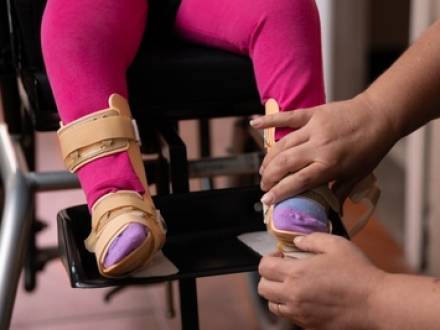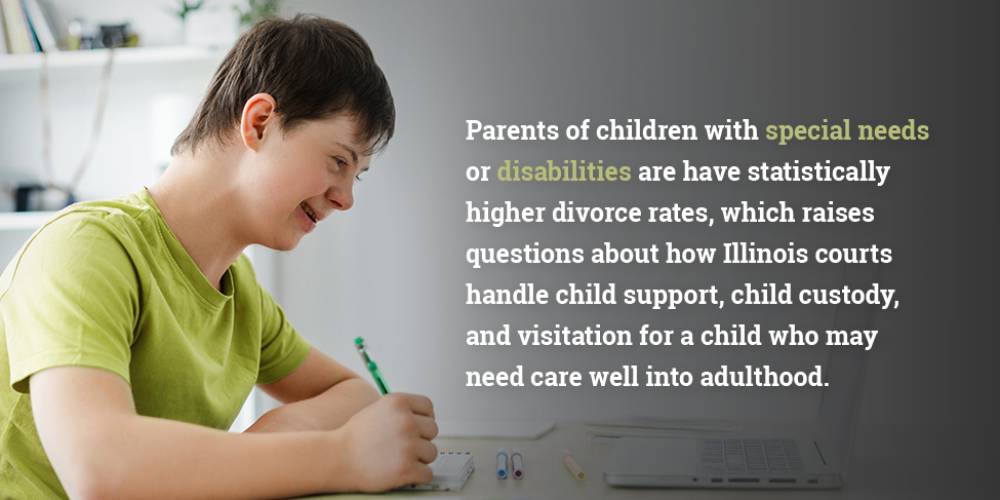630-462-9500
After Hour New Client Telephone Number 630-690-6077
1776 S. Naperville Road, Building B, Suite 202,
Wheaton, IL 60189
Managing a Disabled Child’s Needs During Divorce
 Parents of children with special needs or disabilities are, statistically, more likely to face divorce. Yet a divorce hardly solves the difficult problems of caring for such a child; in certain cases, divorce can aggravate disagreements about a child’s care and place greater caregiving burdens on parents who are already exhausted and burned out.
Parents of children with special needs or disabilities are, statistically, more likely to face divorce. Yet a divorce hardly solves the difficult problems of caring for such a child; in certain cases, divorce can aggravate disagreements about a child’s care and place greater caregiving burdens on parents who are already exhausted and burned out.
Parents often ask how Illinois courts handle child support, decision-making responsibilities (child custody), and parenting time (visitation) for a child who may need care well into adulthood. Understanding your legal options and obligations is essential to ensuring your child’s needs are met both now and in the future, and our experienced team of Wheaton child custody attorneys is here to help.
How Does Illinois Law Treat Disabled Children in Divorce?
In most divorces, child support and custody issues are governed by the Illinois Marriage and Dissolution of Marriage Act (750 ILCS 5/). This law outlines how courts determine parenting responsibilities, parenting time, and child support. However, it also includes important provisions for children with physical or intellectual disabilities.
Illinois courts can order one or both parents to contribute to the support of an adult child with a disability, even after the child turns 18. This means financial support may continue indefinitely if the child is unable to become self-supporting due to their condition.
What Is Considered When Determining Child Support for a Disabled Child?
When determining support for a child with special needs, Illinois courts consider additional expenses that may not apply to other children. Disabled children may require ongoing medical treatment and therapy, special education, vocational programs, home modifications, adaptive equipment, and multiple caregivers. The time and expense of all these services add up quickly, placing strain on parents and caregivers alike.
Judges have discretion to tailor child support orders to meet the unique circumstances of the family and ensure that the child’s quality of life is maintained. Parents can also agree on additional financial arrangements in their divorce settlement to cover future needs.
How Are Parental Responsibilities Decided for a Special Needs Child?
For children with disabilities, parenting responsibilities – the legal term in Illinois for decision-making authority, or custody – can involve more than basic care decisions. Parents may need to coordinate complex medical care, manage educational plans under an Individualized Education Program (IEP), and oversee therapies or daily routines that require significant time and attention.
Illinois law requires courts to allocate decision-making responsibilities based on the child’s best interests. Parents are highly encouraged to create a parenting plan themselves, but when they cannot, a court will make these decisions for them. When necessary, judges may weigh:
-
Which parent has been the primary caregiver for medical and educational needs
-
Each parent’s ability to provide a stable and accessible home environment
-
The child’s relationships with siblings and extended family
-
Any specialized care the child requires on a daily basis
If both parents are committed to working together, they may choose to create a parenting plan that outlines how decisions will be made collaboratively. For high-conflict situations, the court may designate one parent to handle specific areas of responsibility to minimize disputes.

What About Guardianship and Decision-Making After Age 18 When Parents Are Divorced?
When a disabled child reaches adulthood, parents may need to consider guardianship or other legal tools to continue making decisions on their behalf. In Illinois, there are two types of guardianship for adults: plenary guardianship, which gives the guardian full decision-making authority, and limited guardianship, which applies only to specific areas where assistance is needed.
Guardianship decisions often intersect with divorce issues. For example, if one parent is appointed as guardian, how will the other parent remain involved in the child’s care? These questions can and should be addressed during divorce negotiations to avoid future conflict.
How Can Divorcing Parents Plan for the Future of a Child with Special Needs?
One of the most helpful tools parents can use when planning for their child’s future when that child has special needs is a special needs trust. Individuals with disabilities often rely on government benefits like SSI and Medicaid to access healthcare and other support services, but these benefits have income limitations. If someone has access to income or other resources that exceed the government limits, they risk losing access to crucial support services. A special needs trust can help manage these concerns.
Next, parents should seriously consider appointing a successor guardian or caretaker if one or both parents become incapacitated or pass away. Although this may be unpleasant to think about, caring for your child’s future means planning for every contingency.
Finally, parents should think about how they want to manage their life insurance policies or other financial resources, such as estate planning tools, that are intended to benefit their child long into the future. An attorney experienced in family law and special needs planning can work alongside estate planning professionals to create a coordinated approach that safeguards the child’s well-being.
How Can Divorced Parents Avoid Conflict Over Caregiving?
Planning for a disabled child’s future during divorce involves both legal and financial considerations. Depending on the severity of the child’s disabilities, parents may need to have extensive discussions about how to manage their child’s future. If parents struggle to have productive conversations, mediation may be a helpful tool to keep conversations focused and productive.
Parents should also anticipate potential areas of conflict after the divorce is finalized. There are many excellent parenting apps that allow parents to manage their children’s information and communicate without having to discuss complex issues face-to-face. This can help them avoid heated arguments – which are not ideal, especially if the child would be exposed to them — and also documents communications, ensuring parents are on their best behavior.
Contact a DuPage County, IL Divorce Lawyer for Complex Family Needs
If you are facing divorce and have a child with a disability, it is essential to work with an attorney who understands the unique challenges these cases involve. At The Stogsdill Law Firm, P.C., we help parents navigate the legal system and create careful parenting plans that prioritize their child’s care and security. Contact our Wheaton, IL divorce attorney at 630-462-9500 to schedule a consultation and discuss your options.




















